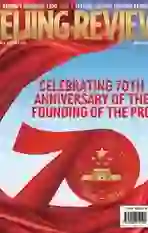Making People First The Guiding Principle
2019-10-16BySwaranSingh
By Swaran Singh
As part of Chinas search for answers to its emerging new challenges of governance, Volume II of Xi Jinping: The Governance of China was published on the eve of the 19th National Congress of the Communist Party of China (CPC) in October 2017. The primacy of people and centrality of the Party continue to be the running theme of the book, which consists of 99 speeches and works of Xi.
Xis speeches and writings show that he is deeply grounded in Chinas intellectual heritage and traditions, and have an equally strong grip on world classics in philosophy and politics. But it is his indebtedness to his predecessors and consciousness of emerging global challenges that defi ne Xis continuing pursuit of the People First governance principle.
Speaking at the 110th birth anniversary of the countrys late leader Deng Xiaoping(1904-97), Xi recalled Deng saying that the ultimate goal of all policies must be peoples satisfaction; and that all brilliant ideas emerge not out of one single mind but from the practices of people. Xi credits former President Jiang Zemin with first visualizing in 2002 the goal of achieving a moderately prosperous society by 2020—a full 10 years before the UN Sustainable Development Goals for 2030. These legacies are writ large in Xis articulations of the two centenary goals (to complete building a moderately prosperous society in all respects by the time the CPC marks its centenary and to build China into a great modern socialist country that is prosperous, strong, democratic, culturally advanced, harmonious and beautiful by the time the Peoples Republic of China celebrates its centenary) and the Chinese dream of national rejuvenation. Xi proposes to achieve these by strengthening further reforms, the rule of law and Party discipline.
Corruption, for Xi, remains Chinas biggest challenge. This has seen him work relentlessly in not just creating deterrents but also promoting loyalty, integrity and professionalism. In the long run, Xi seeks to ensure effective, high-caliber, clean governance.
Economic development remains Xis potent locomotive for ensuring innovative, high-quality and efficient structures of governance. He underlines the need to improve income distribution systems and expand the middle-income group by providing health, education and employment for people to realize their full potential. His strategies for economic, political, cultural, social and ecological rejuvenation begin by identifying areas of weakness to be addressed first. Xi lays special emphasis on supervision, publicity, implementation and evaluation and seeking inputs from the benefi ciaries of various initiatives.
As regards Chinas role beyond its borders, being both a contributor to and beneficiary of globalization, China continues to adapt to emerging trends. This everincreasing involvement with global affairs has seen China deeply engage with the strengthening and transformation of the global governance processes and mechanisms. It requires forging wider networks of connectivity and new global partnerships to enhance Chinas contribution to improving the shared future of humanity. It has seen China implement green, circular, and low-carbon development using innovation and frontier technologies to ensure harmony between man and nature.
This is also seen in Xis reforms of environmental management that seek to empower grassroots-level agencies and experts to ensure clear waters and green mountains. Ecological and environmental protection has become another top priority for Chinas leaders. While admitting that rapid development over the last four decades did accumulate problems of ecological degradation and pollution, China today has the resources and capabilities to address these triggers of public disaffection.
Also, as the global economy begins to emerge from its decade-long deceleration, Chinas Belt and Road Initiative has emerged as a potent engine for boosting connectivity and growth for all.
Finally, Xi underlines consultative democracy as a unique strength of socialism with Chinese characteristics embodying the CPCs mass line that guides Chinas People First governance. In the spirit of the united front, it allows accommodation of non-Communist personalities and other ethnic and religious diversities of this large ancient nation. Even socialist art and literature that cater to this increasing worldwide curiosity about Chinas rise are guided by peoples cultural needs.
